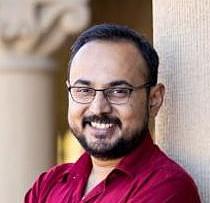A lecture by Mudit Trivedi, Assistant Professor of Anthropology, Stanford University, on how the unexpected histories of a glass bangle force a rethinking of debates about time and embodiment, norms and conduct, and the interplay of materiality and language in a tradition.
Event moderated by Asad Q Ahmed, Magistretti Distinguished Professor of Middle Eastern Languages & Cultures; Professor of Arabic and Islamic Studies; Affiliate Professor of Philosophy; Director of the Center for Middle Eastern Studies at UC Berkeley.
_________________
PLEASE NOTE: This event WILL NOT BE live streamed.
_________________
ABSTRACT
How would the study of South Asian Islam be transformed if reframed as an inquiry into formations of Iman? Can we then rethink what historiography delimits as “religious conversion” or “Islamization” instead as the somatic and affective embrace of the din? Could we then attend to converts’ learning, their intersectionally distinct striving for iman?
 This talk explores these questions in the context of medieval Mewat, an arena at the penumbra of the Persian textual archive. It draws upon recently-documented archaeological assemblages of a qasba and fort-city, Indor, as built by the newly faithful and inhabited from the 14th century onwards. It dwells on the unexpected disclosures of an artifact which reveals itself to be crucial to an archaeology of iman: the glass bangle familiar throughout South Asia. Through this discussion, the talk reflects on the relations of faith to caste and gender, about the methods of genealogy and archaeology, and about how we understand both din and iman. The unexpected histories of the glass bangle force a rethinking of debates about temporality and embodiment, about normativity and conduct, and about the uses of materiality and discursivity within a tradition. The bangle allows our accounts to foreground the virtuous affects of faith as they help the newly faithful journey from hasad (envy) to sabr (patience).
This talk explores these questions in the context of medieval Mewat, an arena at the penumbra of the Persian textual archive. It draws upon recently-documented archaeological assemblages of a qasba and fort-city, Indor, as built by the newly faithful and inhabited from the 14th century onwards. It dwells on the unexpected disclosures of an artifact which reveals itself to be crucial to an archaeology of iman: the glass bangle familiar throughout South Asia. Through this discussion, the talk reflects on the relations of faith to caste and gender, about the methods of genealogy and archaeology, and about how we understand both din and iman. The unexpected histories of the glass bangle force a rethinking of debates about temporality and embodiment, about normativity and conduct, and about the uses of materiality and discursivity within a tradition. The bangle allows our accounts to foreground the virtuous affects of faith as they help the newly faithful journey from hasad (envy) to sabr (patience).
SPEAKER BIO
Mudit Trivedi is an archaeologist with interests in religious subjectivity, materiality, craft and historical anthropology.
His first book project, An Archaeology of Virtue, considers the archaeology of conversion to Islam through the results of an ongoing long-term archaeological project he has co-directed at the site of Indor in Rajasthan, North India. This research bridges archaeological and anthropological conceptualizations of tradition. It considers the thematizations of ethical relations, hierarchies and gendered pious praxis in material media. It brings together analyses of architectural, spatial and artifactual datasets combined with compositional elemental analyses. The project’s wider goals are to rethink the secular modern commitments of archaeology and the nature of the archaeological trace.
Mudit is also interested in developing critiques of archaeology’s disciplinary commitments to liberal values and legal infrastructures. A first paper from this project critically re-situates colonial Treasure Trove laws that framed the archaeological common good around the taking of finds from others. This second project reconsiders archaeological praxis and the discipline’s recourse to property law in a series of South Asian contexts ranging from accidental finds to disputes centred on waqfs.
His forthcoming publications relate to these combined interests. They cover archaeometric insights into social contexts of glass artifact production and use in South Asian and other contexts; the long-term settlement history of the region of Mewat in North India, and theoretical problems in the historical and archaeological study of religion and conversion. He has co-edited a special issue of the Medieval History Journal on ‘Archaeologies of the Medieval in South Asia’.
_________________
Follow us on TWITTER
Like us on FACEBOOK
For DIRECTIONS to the Institute please enter “Institute for South Asia Studies” in your google maps or click this GOOGLE MAPS LINK.
PARKING INFORMATION
Please note that parking is not always easily available in Berkeley. Take public transportation if possible or arrive early to secure your spot.
_____________
If you require an accommodation for effective communication (ASL interpreting/CART captioning, alternative media formats, etc.) or information about campus mobility access features in order to fully participate in this event, please contact Puneeta Kala at pkala@berkeley.edu with as much advance notice as possible and at least 7-10 days in advance of the event.

